Case Study: Why Popularium’s Chaos Agents Runs on Microsoft Azure
After migrating to Azure, the developers at Popularium saw a notable reduction in computation time and the near-elimination of lag experienced by players.

Chaos Agents represents a unique convergence of the strategic depth of autobattler games and the fast-paced intensity of battle royales, designed by Magic: The Gathering creator Richard Garfield. Chaos Agents is the first game from Popularium, a game studio co-founded by Richard with Xbox and Blizzard veterans Jon Bankard and Arka Ray.
To scale Chaos Agents, where each match features globally unique AI-driven Agents making over 12,000 decisions per minute, and to fulfill its promise of making Chaos Agents a "Forever Multiplayer Game," Popularium migrated the Chaos Agents Server Application (MSA) and the proprietary Chaos Cloud Engine to the Microsoft Azure cloud.
This post details the vision, motivations, technical requirements, migration process and the results of Chaos Agents running on the Microsoft Azure Cloud, which include a 17% reduction in computation time and the near-elimination of “lag” experienced by players.
What is the vision for Chaos Agents?
In Chaos Agents, the player is a Nick Fury-type character, assembling the greatest team of superheroes in the universe to compete in intense Chaos Shard battles.
Chaos Agents is the world’s first autobattler-royale, combining the best features of autobattlers and battle royale games with two first-of-its-kind innovations:
- Globally Unique Agents: Each player controls a globally unique Chaos Agent—a superhero with a unique Skill Map that only that player can use in Chaos Shard battles.
Only the player with a permanent contract with anAgent can use that Agent in a match. The unique Skill Map means that the number of Agents that can exist is potentially infinite.
A key design principle for Chaos Agents, as Richard mentioned in his interview with Inverse, is the desire to create the sense of true ownership that players experience with physical games such as Magic, and globally unique Chaos Agents that only one player can own and play with is a key innovation that enables such an experience.
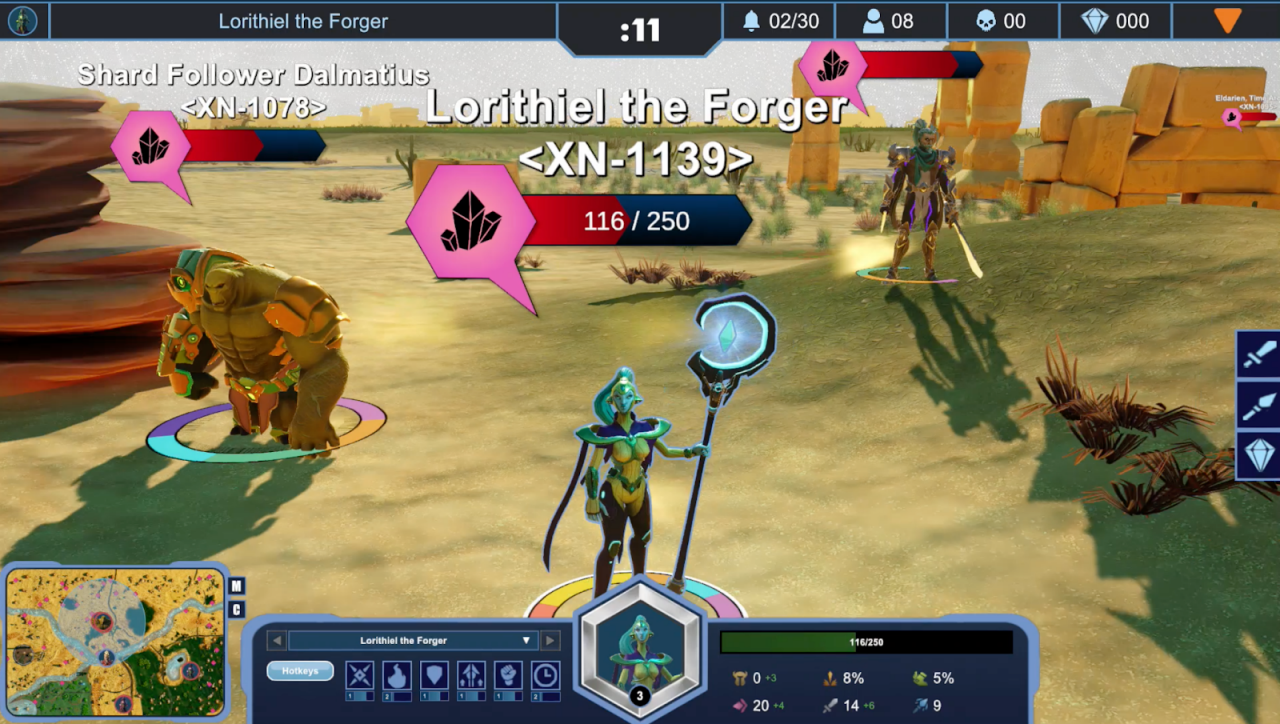
AI-controlled Chaos Agents: Chaos Agents in battle are not controlled directly by the player. Each Agent has its own AI that guides its actions based on high-level strategy and guidance provided by the player.
Thus, every Chaos Agent has to compute about 600 decisions per minute. With 20 Agents in a match, that's 12,000 or more decisions computed per minute. Our eventual goal is to allow even larger battles of 50+ Agents each, requiring a staggering 30,000 decisions to be computed per minute.
Why did Chaos Agents migrate to the Azure cloud?
Richard Garfield, the creator of Chaos Agents and co-founder of Popularium, explains the motivation behind the game’s innovative features, which in turn form the basis of Chaos Agents’ migration to the Microsoft Azure cloud:
“I think auto battlers are this wonderful junction between the analog game culture and the digital game culture. In auto battlers, you do something and then you watch it resolve. It feels like a computer game experience, but at the same time you can sit back and strategize and use the same sort of thinking you do with the paper game.”
“Our attitude is that the people playing the game are the actors in the world. They are the people who are making the story. In Chaos Agents, instead of a constructed deck, you have your character that is actually unique. Your assets are unique by design, and it opens up a lot of things, which I find very exciting in gameplay. We want players to be able to trade [characters and items], sell them, and store them indefinitely. The sort of things you would do with a deck of cards. I look forward to Agents that are regarded as being not very useful, trading hands and suddenly going up the ladders and winning the world championship. I want to see gems in the rough everywhere.”
“To make this vision a technical reality, our team at Popularium spent months building a custom Cloud Engine and Vault architecture from scratch. However, we needed a technical partner and cloud platform that was an expert in both cloud infrastructure and games–Microsoft Azure was pretty much the only clear choice for us given these requirements.”
Chaos Agents migrating to the Azure Cloud cover both benefits the Popularium in the development of the game, as well as benefits players directly.
Benefits to Popularium:
- Handle the very demanding cloud compute requirements of Chaos Agents and the Popularium-developed Chaos Cloud Engine.
- Reduce compute variance and lag that degrade player experience and cause players to quit playing.
- Enable per-player server and compute resources while reducing costs.
- Built-in anti-cheat and anti-hack protections as the server application handles all game-critical decisions, with the clients merely rendering the data sent by the servers.
Benefits to the players:
- Enable Chaos Vaults and dedicated servers that fulfill the promise of Chaos Agents being a "Forever Multiplayer Game," which players will be able to keep playing for as long as they want.
- Let players play Chaos Agents from any device—including low-spec PCs.
- Enable seamless cross-play between console, PC, and mobile players.
- Makes the game accessible to players of all skill levels with protection from griefers, cheaters, and smurfers.
Key technical requirements for Chaos Agents and the Chaos Cloud Engine enabled by Microsoft Azure
There are two key technical requirements for Chaos Agents and the Chaos Cloud Engine that are enabled by the Microsoft Azure migration:
- Compute requirements to determine hundreds of actions taken by each Chaos Agent in the match.
- A “Forever Multiplayer Game” commitment to ensure that players have a way to play Chaos Agents for as long as they want.
1. Compute requirements
Chaos Agents has very strict and heavy computation requirements. All the computation of the game is done using the Chaos Cloud Engine and Chaos Agents Server Application (MSA), while the Maelstrom Client application (MCA) simply renders the data sent by the Popularium Cloud Engine and MSA.
Game loop: The Chaos Agents Server Application has the critical requirement of being able to compute the actions of all players' Chaos Agents in the game, and deliver these decisions to all clients simultaneously so that it can render the game for all players.
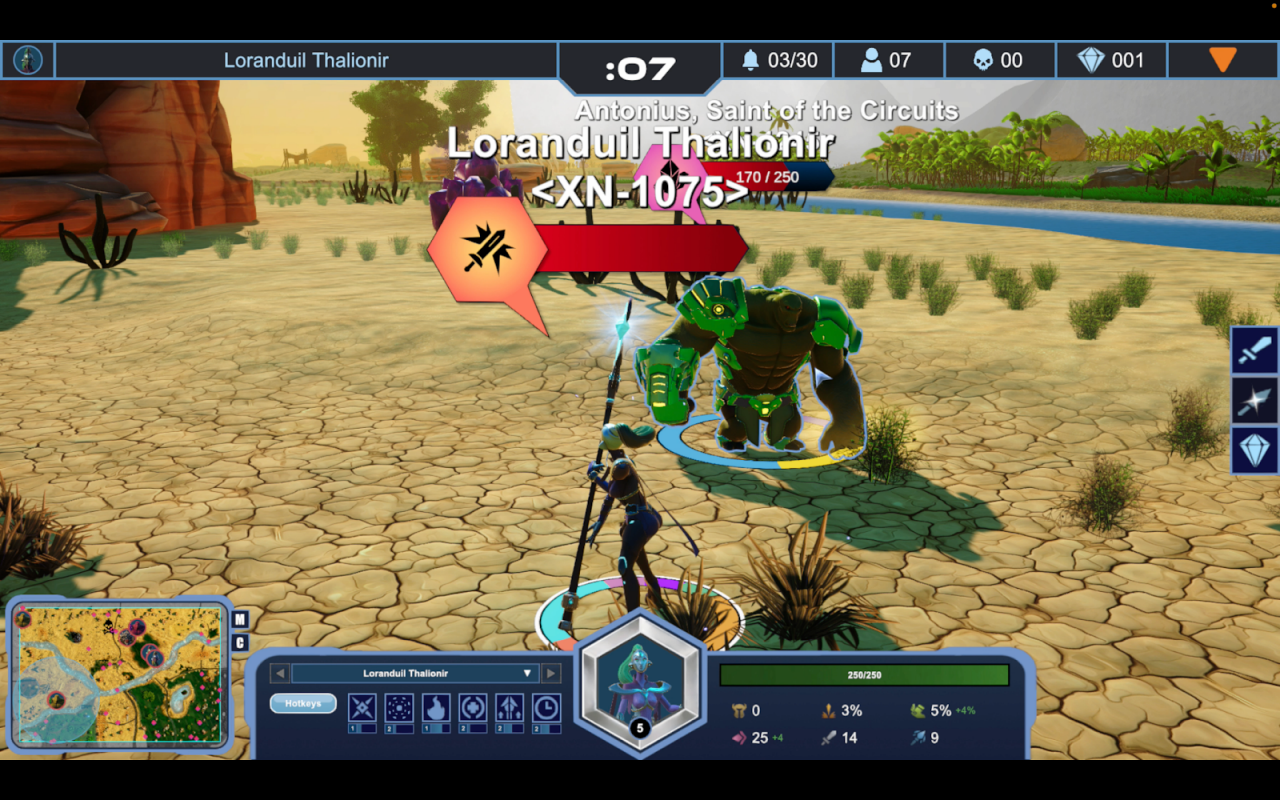
Batch Map period: The MSA needs to compute and deliver about 200 decisions/second in the form of a data structure called an "Action Batch Map" that contains all actions taken by all Agents during that second. The period required for generating a Batch Map is the Batch Map Period and is the key performance bottleneck for Chaos Agents. Minimizing the Batch Map Period is the core requirement for Chaos Agents' infrastructure.
Batch Map processing variance and the effect on lag and performance: The variance of the Batch Map Period is the deviation between subsequent Batch Map Periods. Minimizing variance is key to a smooth gameplay experience for players and is the primary cause for "lag" where the player's client is waiting to receive updated Action Batch Maps from the server.
Server management and availability: Chaos Agents requires a robust cloud server infrastructure that is able to handle:
The extremely demanding requirements for the Batch Map Period and Game Loop.
While minimizing costs and overhead for Popularium.
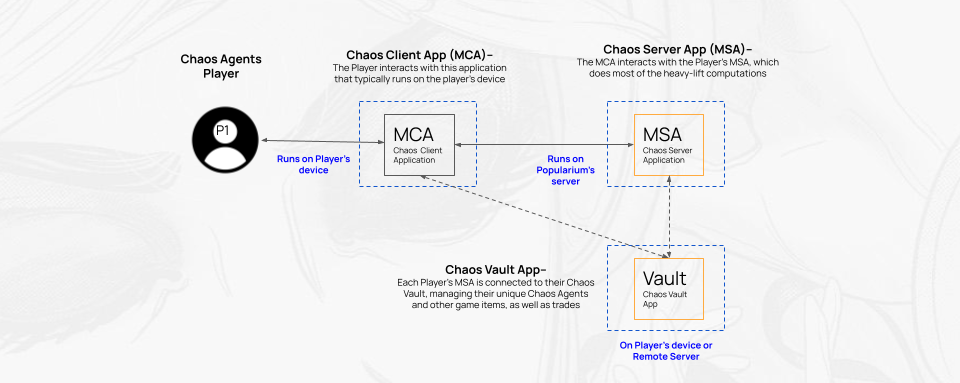
How Azure helps with compute requirements: Having extensive experience with supporting high-concurrency multiplayer games, the Azure Cloud offered flexible options for the base server types required for the Chaos Cloud Engine along with efficient pricing for scale required by Chaos Agents. The primary goal was to minimize Batch Map processing time and variance while scaling the number of players supported. Azure also sets the Chaos Agents infrastructure up for further server orchestration and related optimizations.
2. "Forever Multiplayer Game" commitment to players — Dedicated Servers and Player Vaults
Popularium has made a commitment to players that Chaos Agents will be a "Forever Multiplayer Game" that can't be "killed".
This promise is fulfilled through 2 main features:
- Dedicated Servers support for Chaos Agents, including servers that players can set up and run themselves.
- "Chaos Vaults" that players can download and store that contain the licenses for all the in-game Chaos Agents items that they own, including all their globally-unique Agents.
Dedicated servers allow players to continue playing Chaos Agents without the requirement of connecting directly to the official Chaos Agents Network and Chaos Vaults enable players to prove their ownership of in-game items to any dedicated servers, whether run by Popularium or by players.
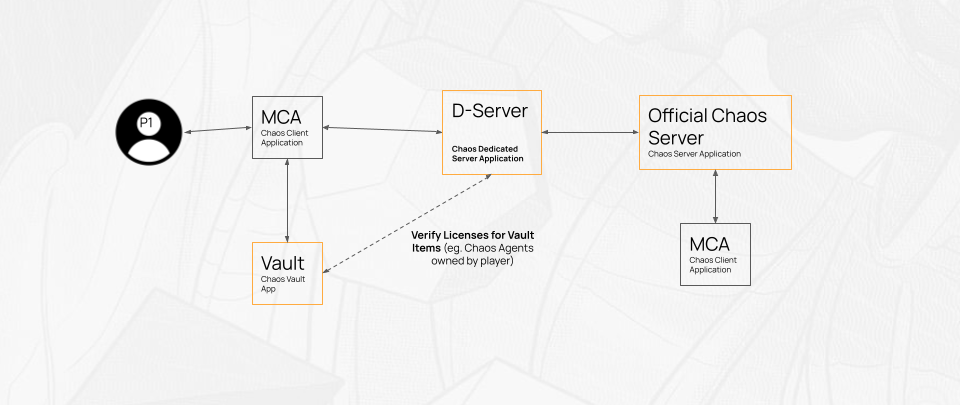
These features together ensure that Popularium is able to fulfill its promise of Chaos Agents being a "Forever Multiplayer Game" that can't be "killed".
For technical details on Chaos Agents as a "Forever Multiplayer Game" and the design and implementation plan for dedicated servers, see this two-part blog post:
Inverse wrote about Chaos Agents adopting the "Forever Multiplayer Game" model that goes into much more detail about the Popularium team's motivations behind this investment.
How Azure helps with “Forever Multiplayer Game” commitment: The product tiering, pricing, and flexibility from the Azure Cloud also makes it scalable to plan for dedicated server support that gives the player the option between choosing a virtual Azure-powered server to host their dedicated server, or a self-managed machine that is set up to connect to the Azure cloud and Chaos Engine.
Migration and Results
Migration: The Chaos Cloud Engine and Chaos Server Application were migrated to the Azure cloud in March 2025, just before the expansion of the Chaos Agents private Alpha.
Testing at Live Events: The deployment of Chaos Agents and the Chaos Cloud Engine on the Azure cloud was tested intensively at 4 live events featuring hundreds of players playing Chaos Agents concurrently:
- March 23 in Sunnyvale, CA: First Gold Trial of the Chaos World Invitational
- May 10 in Los Angeles, CA and Boston, MA: Second Gold Trial of the Chaos World Invitational
- May 15 in Brooklyn, NY: Third Gold Trial of the Chaos World Invitational
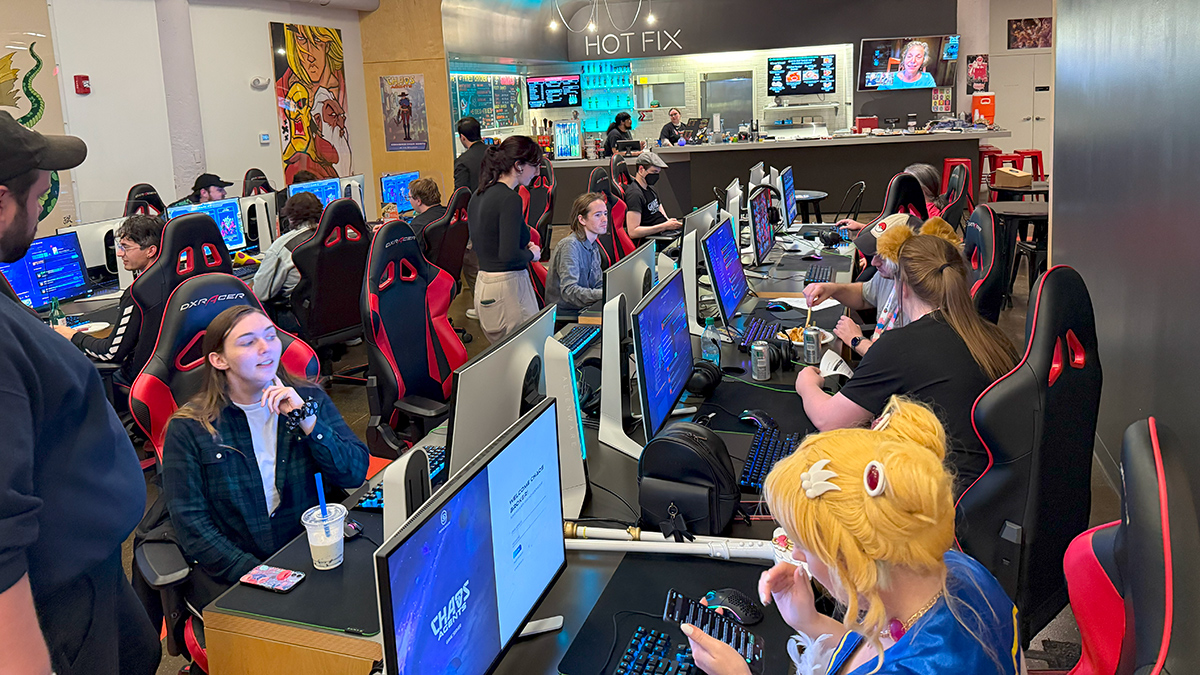
Boston, MA
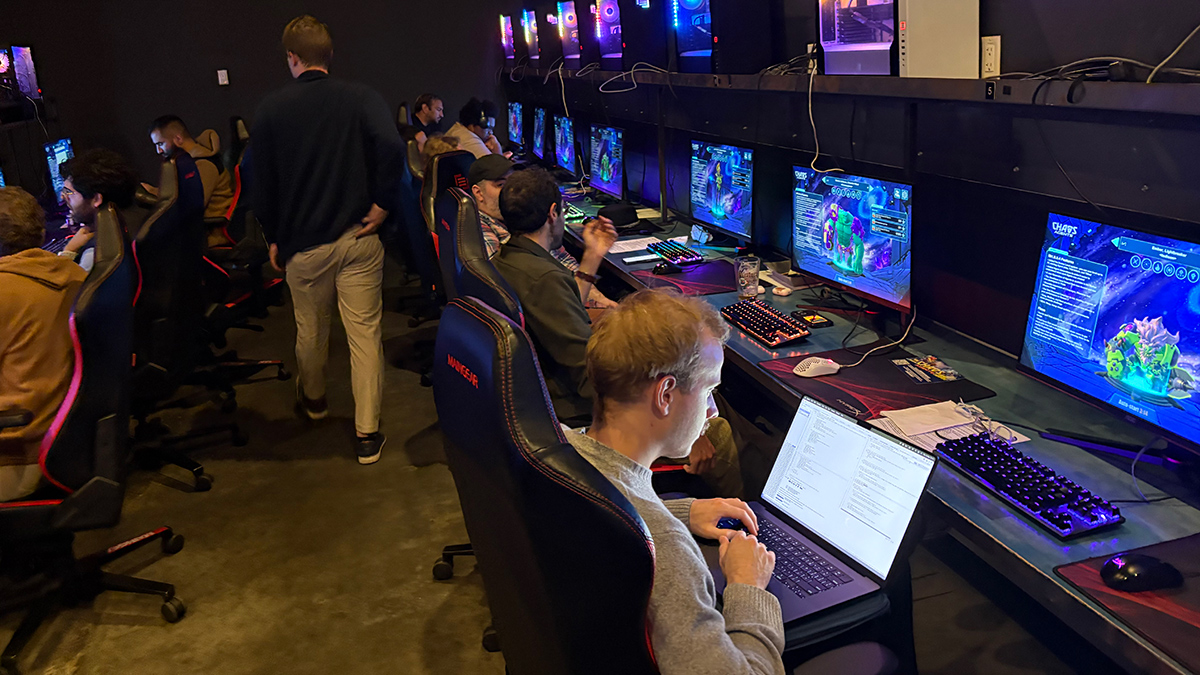
Brooklyn, NY
Results after the Migration: The performance improvements due to the migration to Azure were immediately visible, with significant decrease in the Action Batch Map processing time and variance.
The results are made even more impressive by the fact that the testing was performed during tournaments or "Trials", which feature the highest-leverage and most-performance-required matches that tend to have the most players alive for the longest times.
- Action Batch Map Processing time reduction: The median processing time for Action Batch Maps was reduced by 17% from 24.74s to 20.52s.
- Batch Map Variance reduction: The variance for Batch Map processing decreased by over 12% to 3.2 seconds. As the Chaos Agents Client application is very sensitive to Batch Map variance, the 12% reduction has a significant multiplicative effect in reducing the lag experienced by players to nearly zero.
- Lower costs for dedicated server resources per player: The more efficient batch map processing has lowered the cost of per-player compute resources, allowing Popularium to support significantly more players concurrently, at the same cost.
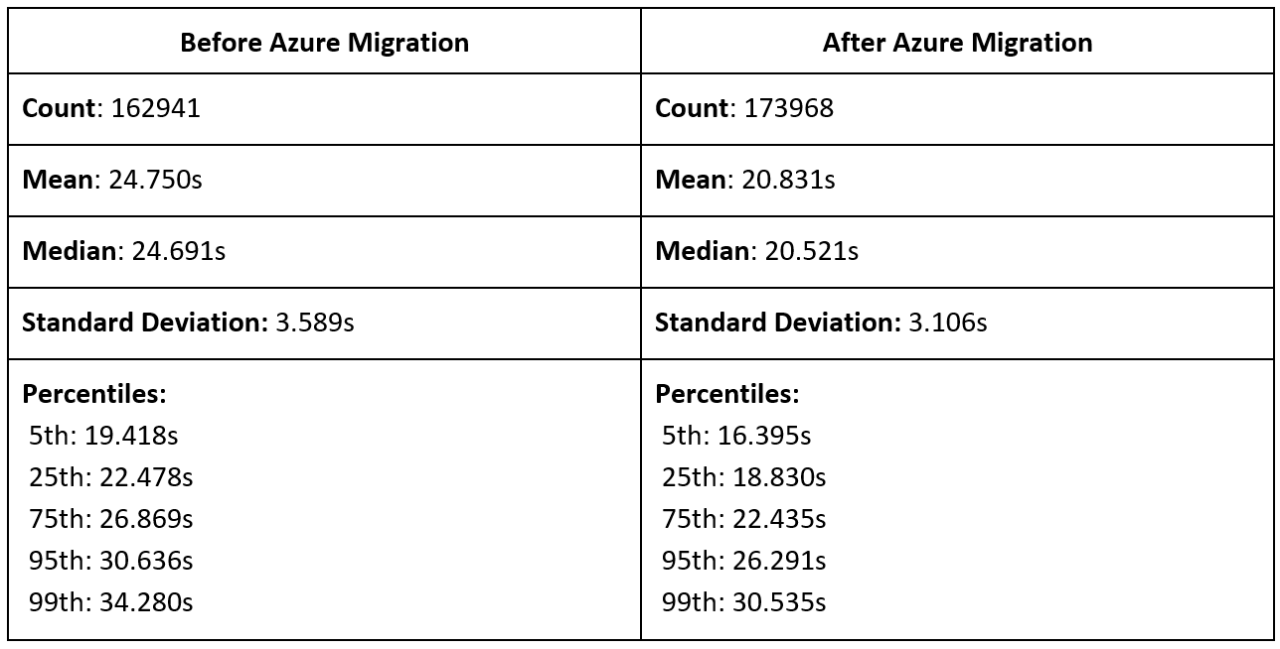
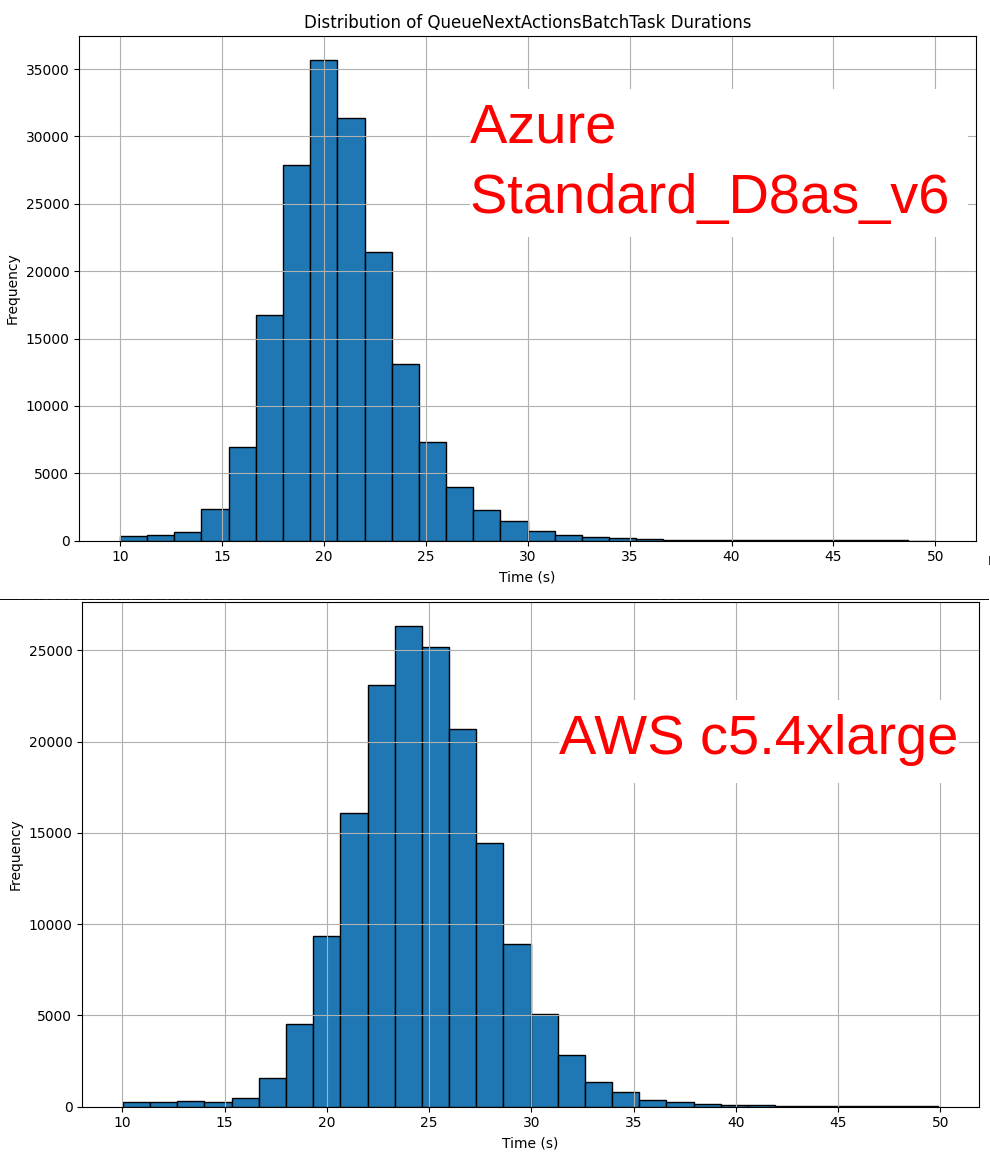
Summary of improvements after migration to Azure:
- Desynchronization and crashing events were reduced by over 80% compared to before migration.
- The amount of lag experienced by players decreased to the point where it's now barely noticeable.
- The number of simultaneous matches and players who can play Chaos Agents concurrently went up by over 10x compared to before migration.
Conclusion
Migrating Chaos Agents to Azure has been transformative. We've hit real-time compute goals, minimized lag, scaled match capacity tenfold, and delivered on our Forever Multiplayer promise.
Join the Chaos Agents private Alpha and experience Azure-powered gameplay firsthand.

